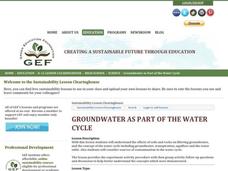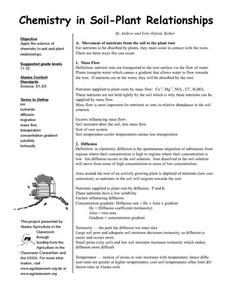Nuffield Foundation
Measuring Rate of Water Uptake by a Plant Shoot Using a Potometer
How quickly does a plant transpire? Learners explore this question through measuring water uptake with a potometer. They time the movement of a bubble a set distance to understand the motion and rate of speed.
Curated OER
Leaves, the Sun, and the Water Cycle
As a way to combine life and physical science, or simply as an investigation of plant transpiration, this lesson is sure to inspire! Middle schoolers capture the moisture given off by plants that are placed in different conditions. They...
Curated OER
Plant Transpiration
High schoolers conduct various experiments to investigate plant transpiration. In this biology lesson, students explain how this process helps maintain the hydrologic cycle. They measure the rate of water loss in plants using a potometer.
Curated OER
Transpiration
Students interactively explore the term transpiration. In this science/ecology lesson, students discuss what they would do if they were thirsty while conducting research in Brazil. Additionally, students write descriptive words to...
Curated OER
TRANSPIRATION IN PLANTS
Pupils define the hydrologic cycle, define transpiration, name the three parts of the hydrologic cycle, and record the amount of moisture given off by several green plants.
Curated OER
Groundwater as Part of the Water Cycle
Make sure to read through the activity procedures thoroughly before teaching this lesson because the materials list is incomplete. Also, the mentioned worksheets and booklet are not available. However, there is no need to discard this...
Curated OER
Transpiration
Students explore what affects the rate of transpiration in plants. They measure the rate of transpiration and analyze variables and additional factors that might slow or speed up the rate of transpiration.
Curated OER
Transpiration
Young scholars explain the function of the hydrologic cycle and demonstrate how transpiration rates can be experimentally changed.
Curated OER
How Much Water Does A Tree Transpire In A Day
Students engage in a lesson of investigating the amount of water that is transpired in a one day cycle. They conduct research to find the purpose of transpiration and find information to explain the value to a plant and explain how...
Curated OER
Leaf Transpiration
Young scholars determine the amount of water loss due the transpiration.
Curated OER
A Close Encounter of the Tree Kind
Students study trees in their natural habitat. In this tree lesson, students complete a number of outdoor activities to estimate the height of a tree, examine how bark can be a distinguishing tree characteristic, and how to make a bark...
Curated OER
Photosynthesis
Students conduct a variety of experiments on photosynthesis. In this biology lesson, students identify the factors required for the process to occur. They perform computerized experiments to test the amount of oxygen produced when plants...
Curated OER
Transpiration
Students examine the part that transpiration plays in the hydrologic cycle. They observe how plants play a role in maintaining a stable environment.
Curated OER
Chemistry in Soil-Plant Relationship
Students apply the science of chemistry to soil and plant relationships. They define diffusion and indicate for which of these nutrient(s) would you expect diffusion to be the most important for movement to the plant root? Pupils...
Curated OER
Water Pollution Lesson Plan: What's the Flow?
Students study urban runoff. They identify the urban runoff in a simulated area and determine peak flows using charted data. Finally, they discuss possible causes of the differences in flow rates.
Curated OER
The Water Cycle
Seventh graders discover how water circulates through the earth and its atmosphere while determine how much of the Earth's water is suitable for drinking. They discover the meaning of evaporation, transpiration, and precipitation and...
Curated OER
What's The Flow?
Students examine urban runoff and identify peak flows. They examine causes for different flow rates, and complete worksheets and a graph.
Curated OER
Village Research
Sixth graders research global warming. In this science lesson, 6th graders collect data in the Waterton Townsite, Apgar Village and St. Mary area. Students interpret the data and form a hypothesis about global warming.
Curated OER
Amazon Water Cycle Role Play
Students participate in a role play where they play clouds, the ocean, rain drops, and more in order to learn about the water cycle. In this water cycle lesson plan, students have discussions and learn vocabulary.
Curated OER
The Atmosphere and Flight
Students investigate evaporation and condensation, and apply the concepts to understanding cloud formation.
Curated OER
Tree Bagging
Students bag trees to determine the mass of the water given off in the evapotranspiration process.
Science Education Resource Center at Carleton College
Serc: Rain Erosion: Does the Rate of Water Effect Erosion?
In this lab, students investigate whether the rate of water falling (rain) affects the amount of erosion (soil movement). This experiment could lead to further questions: how does grass or rocks effect soil erosion, does erosion lead to...





















